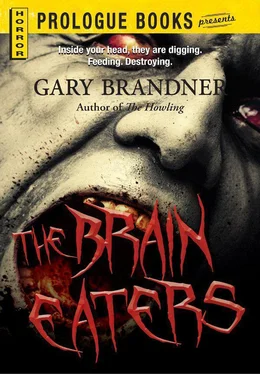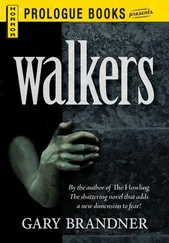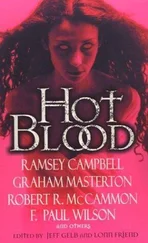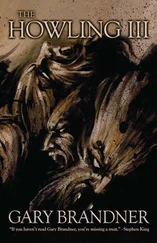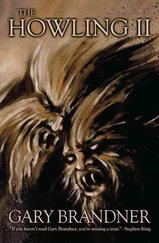An infantry lieutenant, Rudy had returned home with an arm shot off at Bastogne. He had refused to flee toward the American lines when the Russians approached, choosing to stay with his mother and younger brother. They came in the afternoon and took him away. No time for good-byes. The next day everyone was ordered to the tiny neighborhood park. There Frederich, along with his mother and many of their neighbors, were forced to stand and watch. Rudy and three other young soldiers were hung by the wrists, their bodies wrapped like mummies with celluloid film and set afire. The crackle of the flames, the screams, the burned meat smell, never left Frederich Kitzmiller.
• • •
“All that was forty years ago,” said the filtered voice, as though reading his thoughts. “It is a different world today. Different wars, different enemies. We all have to change with the times.”
“I suppose so,” said Kitzmiller, willing his mind back to the present. “I shall try.”
“Let’s bring in Gault,” said the voice. “He ought to be sweating enough by now.”
Kitzmiller nodded and touched a button on his desk.
The door opened, and Eddie Gault looked into the office. He stood uneasily at the edge of the burgundy carpet, blinking rapidly.
“Please come in, Mr. Gault. Have a seat.” Dr. Kitzmiller’s precise manner of speech did not achieve the intimate effect he was trying for.
Gault came forward and sat on the edge of a chair across the desk from Kitzmiller. He was a thin man with reddish hair that had retreated halfway back his head, exposing a pale, freckled scalp. His long limbs seemed to have been hung on the torso without regard for symmetry.
“Have you had a chance to do some thinking since our last discussion?” Kitzmiller said.
“It’s just like I told you then,” Gault said, blinking. “It was an accident. I don’t know how it happened, but it did. My fault. I don’t deny it.”
“Eddie …” The first name did not roll easily off the doctor’s tongue. He had a strong sense of the order of things, and it was not orderly for the chief of biochemical research to call a worker by his first name. However, he had received pointed suggestions on how to conduct the interview, and he would make an effort to follow them.
“Eddie, you have been an employee of Biotron for, what is it, three years?”
“Four. Almost five.”
“Yes, just so. Your record until now has been exemplary.”
“I’ve always tried to do my job.”
“I know. You are a conscientious man. Which makes it all the more difficult to understand how you could confuse a canister clearly and unmistakably marked for disposal with one containing purple dye.”
“A mistake, Dr. Kitzmiller. I’m sorry. What else can I say?”
“A most unfortunate mistake. And rather a costly one.”
“Costly?”
The response, Kitzmiller thought, came too quickly. He studied the boyish, freckled face but could detect no hidden emotions. Perhaps the man behind the mirror was doing better.
“Several cows had to be destroyed.”
“There was nothing in the paper.”
“Fortunately, the cows were the property of our research department, and we were able to avoid publicity. Nevertheless, considering the price of dairy products today, the loss was not inconsiderable.”
It was an attempt at humor that failed miserably.
“You do understand,” Kitzmiller went on when there was no response, “that anything you tell me here will be confidential.”
“There’s nothing more I can tell you,” Gault said. “Somehow I mixed up the labels on the canisters. It was a clumsy mistake, and I’ll do whatever I can to make up for it.”
Kitzmiller pressed his long, graceful hands together and touched the tips of his forefingers to his lips. “That is not for me to determine.” He stole a glance at the mirror. “You will call me if you should, ah, remember any point you might have overlooked?”
“I’ll do that,” Gault said.
Yes, you will , Kitzmiller thought, on the day pigs fly . Aloud he said, “Thank you for coming in, Eddie. We will talk again.”
Ed Gault pushed himself out of the chair and walked carefully across the carpet, his shoulders hunched as though he expected an attack from the rear. When he had gone out and the door had closed silently behind him, Dr. Kitzmiller sighed heavily. He swiveled around to the antique mirror and flipped on the intercom speaker.
“He’s lying,” said the disembodied voice.
“I know,” said Kitzmiller wearily. “I know.”
• • •
Eddie walked out of the building, across the green lawn, past the unobtrusive guard gate, and into the employees’ parking lot. His spirits soared when he saw Roanne waiting for him in the van. Her straight milky hair shimmered in the afternoon sun.
Eddie could never quite believe his luck in finding a girl like Roanne Tesla. At thirty-six, he had been deeply involved with a woman only once before. That was with a fat, sullen girl he married in hopes it would keep him out of the army. He was drafted anyway, and when he finally got back from Nam, he found his slob of a wife seven months pregnant by God knows who. After that, he pretty much swore off women, until Roanne came into his life.
When that happened, Eddie could hardly believe his luck. She could have had a lot of guys, but for some reason she chose him. He decided it was part of her general rebellion against most everything, which she lumped under the Establishment, and against her father in particular. She rarely spoke of the father, but Eddie gathered he was a square, conservative Republican and would probably not have chosen Eddie Gault for his daughter. That was fine with Eddie. If Roanne’s rebellion against her father put her in Eddie’s bed, he hoped the two never made up.
She stepped out of the van and ran toward him, her leather sandals slapping on the blacktop of the parking lot. He gathered her in, savoring the feel of her warm young body under the granny dress. She smelled like fresh-baked bread.
“How did it go?” she said.
“Okay. They didn’t fire me or anything.”
“That’s good. Who was there?”
“Just me and Kitzmiller.”
Roanne looked disappointed. Eddie felt he had let her down. He thought hard for something else to tell her.
“He said the cows died.”
“He did?”
“Yeah. Or had to be killed, or something.”
“I wondered what happened to them.”
“They belonged to the company is why we never heard. Took them back to the labs, I guess.” Eddie felt his mood beginning to sag again. “Honey, I wonder …”
“What?” she prompted.
“I wonder if maybe I shouldn’t tell them the truth. This whole thing might be a lot more serious than we thought.”
Roanne pulled back a step and looked at him. “Eddie, do you think that what’s happening to the earth, the air, the water we drink, is serious?”
“Well, sure, but — ”
“What you and I have done will help make other people, millions of them, aware of what is happening to our environment and who is to blame for it. I know it isn’t easy. You and I are going to have to be strong and love each other and always remember how important the work is that we’re doing.”
Eddie chewed on his lip as he digested Roanne’s words.
“Poor darling. They’re putting you through a lot, aren’t they.” She touched his flat stomach. Her fingers moved down over his belt buckle and found the bulge of his penis. She squeezed him gently, rhythmically. “Let’s go home. I’ll make you feel better.”
All the anxiety and tension that had been building in Eddie throughout the afternoon drained into his crotch. He let Roanne take his hand and lead him to the van.
Читать дальше
